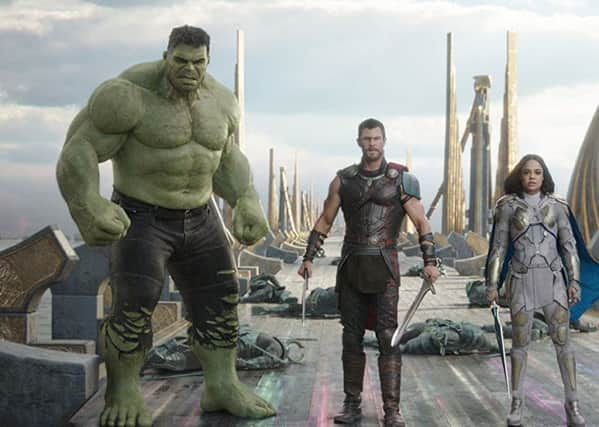Film reviews: Thor: Ragnarok | Call Me By Your Name | Breathe


Thor: Ragnarok (12A) ***
Call Me By Your Name (15) ****
Breathe (12A) ***
The only thing that makes sense is that nothing makes sense,” says a blue rock monster with a New Zealand accent at one point in Thor: Ragnarok. Given that said monster – his name is Korg – is played by director Taika Waititi (What We Do in the Shadows, The Hunt For the Wilderpeople), take this to be his own playful way of acknowledging the confusion inherent in trying to make sense of a vast superhero franchise that not only mixes sci-fi, Norse mythology and big green monsters, but is by now so convoluted – this is the 17th movie in the interconnected Marvel Cinematic Universe – that you really need a Powerpoint presentation running concurrently with the film to have any hope of keeping track of the myriad characters and plot machinations.
The good news, though, is that in acknowledging that nothing really makes sense for lay viewers, Waititi has freed himself up to make the most idiosyncratic Marvel movie since Shane Black turned Iron Man 3 into a sardonic, self-aware send-up of the whole genre. Waititi’s comic sensibility is much gentler than Black’s, however, and that’s reflected in the way he’s made a superhero movie that’s not afraid to be silly.
Advertisement
Hide AdIt’s also gone full retro – but in a good way. Unlike this year’s cynical, smug and rather charmless Guardians of the Galaxy sequel, the production design and music reference the 1980s in ways that have genuine affection for the era. And the film isn’t content to simply bandwagon-jump Stranger Things and It either. Thor’s touchstones are the shonky sci-fi films and synth-pop of the era. This is a film made by people who have clearly imbibed Flash Gordon, Tron and forgotten Star Wars rip-offs like Krull in their youth. It’s a film that thinks nothing of referencing Duran Duran in the wardrobe choices of one major character and Jean-Paul Gaultier in those of another. It’s also a film that may be bookended with the thunderous riffs of Led Zeppelin’s Immigrant Song – with its galloping drums and Thor-appropriate “hammer of the gods” war cry – but reverts to the new wave synth-stylings of Devo’s Mark Mothersbaugh for the majority of the score.
That’s all to the good, especially given the Ragnarok portion of the title is a reference to a coming apocalypse set to spell the end for Thor’s home planet of Asgard. Nevertheless there’s only so much dismantling of the Marvel house-style permissible. Action-wise it’s CGI overload all the way with the same bloodless, destructive set-pieces Marvel has made its stock-in-trade.
Even with the addition of Cate Blanchett as the villainous older sister of Thor (Chris Hemsworth) and his back-from-the-dead brother Loki (Tom Hiddleston), the film only really comes into its own when it deposits the brothers on a day-glow scrapyard planet ruled by an egocentric oddball. Said oddball is played by Jeff Goldblum and his character’s penchant for gladiatorial combat results in a hammerless Thor facing-off against “a friend from work” (hint: he’s big and green), who just happens to have landed on this planet too. There are a lot of coincidences like that in the film, but it also throws up some nice surprises, like the addition of Tessa Thompson as an unapologetically drunken Valkryie warrior from Thor’s home planet. Though she dresses and acts like she’d rather be in a Mad Max movie, she’s a great addition to this male-dominated universe and her comic repartee with Hemsworth is nicely judged. In some ways it’s a shame the film isn’t quite as entertaining as this lengthy second act, but it’s also reassuring that good directors can still find ways to put their own stamp on these gargantuan movies.
Call Me By Your Name sees Italian director Luca Guadagnino follow up A Bigger Splash with an intimate coming-of-age story that’s much mellower in tone, if not in the passions it’s exploring. Set over the course of a languorous summer in Northern Italy in 1984, it revolves around Elio (Timothée Chalamet), the 17-year-old son of an American academic (Michael Stuhlbarg) who falls for Oliver (Armie Hammer), his father’s 20-something research student. Truthful in its depiction of teenage sexual confusion and desire, it’s a film that captures the way both can be all-encompassing, but also poignantly makes clear how important those early experiences are in shaping the people we become. The performances are casually brilliant, with Hammer good as the exotic, American interloper and Chalamet excellent as a kid forcing himself to be open to experimenting with who he might really be. Stuhlbarg too has quite a remarkable scene towards the end of the film that underscores the importance of seizing love in whatever form it takes.
Marking the directorial debut of Andy Serkis, true-life tear jerker Breathe may seem like an unusual choice of project for the motion capture pioneer, but not when you realise its subject – polio sufferer and disabled rights campaigner Robin Cavendish (played by Andrew Garfield) – invented a future for himself in the 1950s by developing technology that would allow him to experience the world in ways that were unimaginable to the medical authorities of the time. Though the film conforms a little too neatly to the inspirational biopic movie tropes, Serkis contrives a few scenes of almost sci-fi like horror that occasionally break Cavendish’s story out of the film’s own stiff-upper-lipped conventions. ■